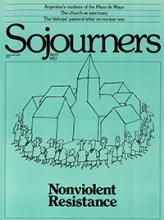I.
A mob of women besieges the grocery
with stove-pipe hats above
their black and gray braids.
There on the film screen
I see you,
Domitila Chungara.
A seafoam shawl wraps your round head.
Wool dresses layer
your body that is like a clay
fertility idol.
Your voice cries with eagle
in it. Piercing, melancholy woodwind.
Another chola beats the counter.
"What shall we feed our husbands?
The store has no rice, no corn, no beans, no medicine.
The men get no wages. We feed
our children broth
made of ashes.
When our men come from the mines
they spit their blood."
II
In pink-brown dirt their
bare brown legs
stomp to a few brass tones.
Woven skirts flounce, colorful
as maps.
Bonfires climb the tiers of
the mining camp.
Night-hidden, boy soldiers climb,
orange neckerchiefs
between khaki suits and caps.
But the same cheekbones
push like volcanoes under skin.
They swarm the rows
of stucco houses with cells
for every family, a warren
where soldiers hunt
men like ground squirrels.
Shouting and running,
doors beaten down, twisting human
forms dragged out to be stilled
in falling.
Flush them at one end, boys,
blow them apart at the other.
The union siren blinds
like a naked bulb. Its mechanical
mouth, a cyclopean witness in hysteria.
III
Women keen the corpses.
Stiff, spattered workclothes.
Dusty cotton shirts with flesh claws
at the cuffs.
That were men.
That were twelve-year-old sons.
The siren keens and wails on the
VW microbus, painted with one
horizontal and one vertical red stripe,
a plus sign, a joke.
Rage blasts for baskets
lowered to wisk away scarecrows, leaving
starbursts of red
on blue stucco walls.
Starbursts.
Red flowers of blood.
Read the Full Article
